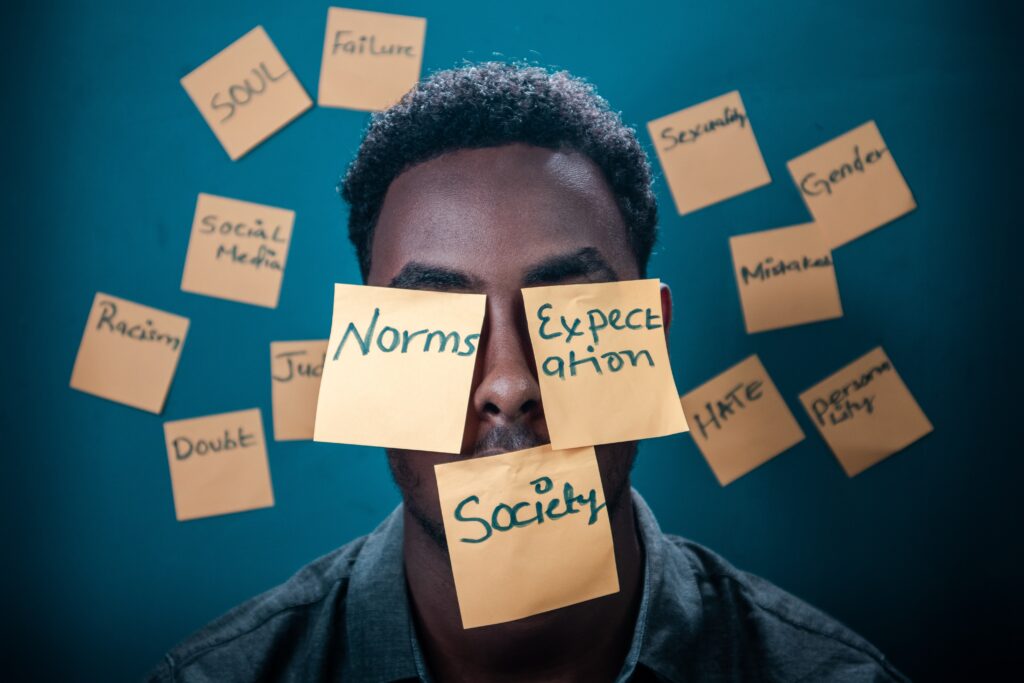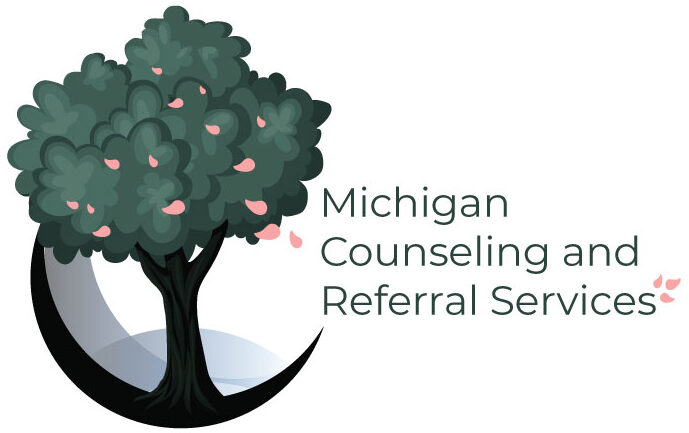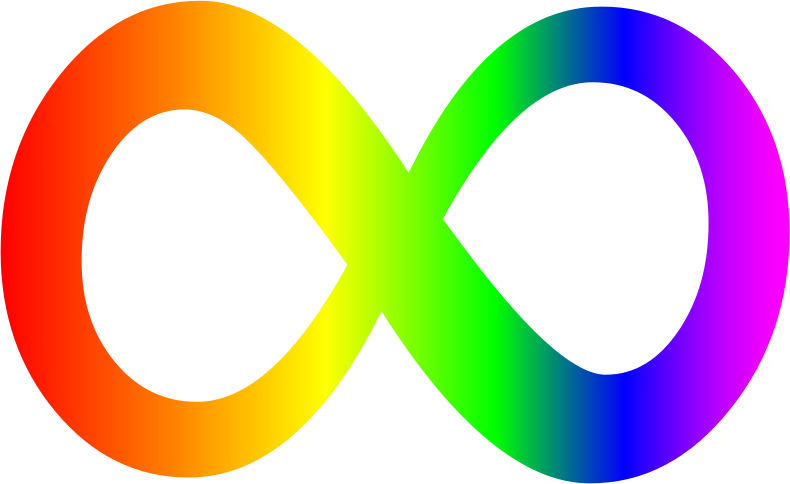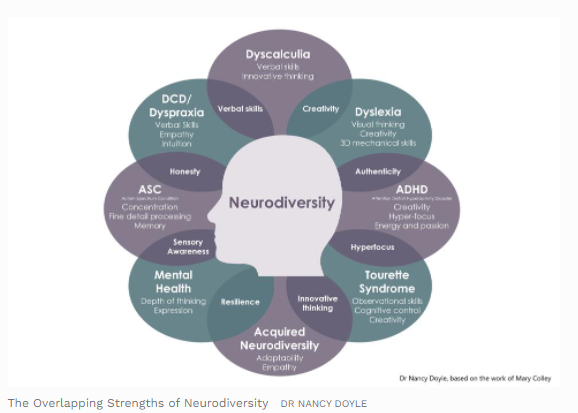Table Of Contents
What Counts as Neurodivergence
Neurodiversity is a term that has surfaced recently that has its place among these other factors of our human existence. But what counts as neurodivergence?
We are constantly learning more about ourselves as a species in our world everyday. From race, culture, language, religion, even biological and many other factors of our existence we find that we as individuals all have our own unique positions in society and nature, alike.
The following conditions are considered neurodiverse by our current definition:
- Autism
- Attention Deficit Hyperactivity Disorder (ADHD)
- Obsessive Compulsive Disorder (OCD)
- Dyslexia
- Dyspraxia
- Tourette’s Syndrome
- Dyscalculia
- Dysgraphia
- Meares-Irlen Syndrome
- Hyperlexia
- Synesthesia
- Anxiety
- Trauma
- Sensory Processing Disorder
- Rejection Sensitive Dysphoria (RSD)
What does Neurodiversity Mean?
Your understanding of neurodiversity will begin in its history. The history of the neurodiversity movement began in the early 1990s. According to the Autistic UK CIC the movement for neurodiversity sprung from the autistic rights movement. It was in 1998 that an autistic Australian sociologist named Judy Singer first coined the term “neurodiversity”.
Originally, neurodiversity was a term meant to promote the cultural acceptance, not a cure to autism and Asperger’s, specifically. Neurodiversity would later be expanded to include other previously defined conditions as I listed above.
What once were thought of as deficits/disorders are now being recognized as what we call in the field of psychology ‘differences in cognitions’.

What Counts as Neurodivergence-You Have Strengths!
I would even go as far to say that conditions that are considered neurodiverse even give us unique strengths! Simply put, this is a lens you see through that makes your brain and your ability to process the world around you unique!
Out of the box thinking is a major factor in what makes you neurodivergent, among many other factors. The goal here is to embrace your cognitive differences, as we need them to help fully shape the human experience.
The push is not to view these as mental illness, but to view them similarly to biological traits such as eye color, height, etc. We all have varying levels of neurodiversity and it should be acceptable no matter how you present.
What Counts as Neurodivergence-A Cure?
Our push in the field of neurodiversity is more for cultural acceptance of these divergences vs a cure for them. “Cure” for these divergences was brought about by those who mostly identify as neurotypical.
The biggest reason I love the neurodiversity movement is because it was started by those of us with the label, NOT neurotypical folks that saw our ways of thinking problematic.
Thinking of neurological differences as disorders placed on us by neurotypical people is precisely the reason many of us who are considered neurodiverse struggle to live successful lives by the standards set by a neurotypical majority.
As a therapist, especially a neurodivergent therapist, the only person who should be allowed to make decisions for my neurodivergence is ME. Even mental health practitioners should NOT diagnose neurodivergence on paper without the consent from us, the neurodivergent population. These diagnoses only serve to stigmatize us on paper and label us in unhelpful ways.
All of this applies to you, too! If you are neurodivergent, you are the only person who gets to have a say in how you operate. Being considered neurodiverse is absolutely not a disorder! Many of us simply need a little more support managing ourselves in a neurotypically-dominant world.
Am I considered Neurodivergent?
If you are a visual learner like me, this graphic from the Forbes article by Nancy Doyle–The World Needs Neurodiversity will be super helpful in depicting what neurodiversity is.
I would even go as far to say that this graphic is even further encompassing of neurodiversity than simply the conditions listed above.
As it looks like in the graphic, neurodiversity is more of a spectrum than concrete categories to define people based on. It is possible for you to have traits from every one of the outlined neurodivergences as opposed to concretely all of the symptoms of one or two.
After all, you are the only person with your brain. It is not going to match the exact traits of somebody else’s brain in its entirety, but will contain traits from all of these domains. That is was makes us diverse!
What Counts as Neurodivergence Through An MRI
What we do see in neurodiverse populations, however, is a generally similar activation of different brain regions that may associate you with other folx of similar neurotypes. No two ADHD brains are exactly the same. However, the way they function under an MRI scanner tend to look very similar to each other as well as different from somebody who is neurotypical.
So do you fall into any of these spectra? I would recommend clicking on the graphic or my link above to read Nancy’s article, it really puts into words nicely not just the acceptance of neurodiversity, but the necessity for its existence for the human race to thrive.

You Count as Neurodiverse-If You Want To Be!
A controversial idea in our field, as well, is that neurodivergence is actually okay to be self diagnosed. In fact, we prefer to call it self-determination as the word “diagnosis” tends to have negative stigma associated with it. Check this article out about why diagnosis can be a touchy subject in mental health.
So the idea here is that because you are identifying a potential piece to your personality vs a condition that needs to be treated, it is alright to identify your neurodivergence independently. There will be others who disagree, but I say join the party. Learning about yourself on the deepest possible level is the most important way to begin living a more satisfying life.
The best way to find out if you are neurodivergent is to do some research. Start with general definitions and work your way up to more scholarly articles and essays on different divergences. Think specifically about which one(s) you identify most with based on your tendencies.
Also, key into how you feel day to day with the folx around you. Do you feel like you connect to certain people better than others? Do you struggle to connect? What are aspects of your personality that are alike and different from others around you?
All of these questions can lead you to an answer of how to know if you are considered neurodiverse. I plan to write more on this subject in the future so keep your eyes peeled if you liked this article.
What should I do if I am considered Neurodivergent?
And now the golden questions. I am neurodivergent, so what do I do now? Well, the beauty of understanding a condition you may have as neurodivergence is that you do not have to do anything if you do not want to! There is nothing wrong with you and you are beautiful just the way you are.
Having said that, as a neurodivergent person, I can say that in life it can be difficult when neurotypical people struggle to empathize with our experiences. This can make life more challenging for us vs our neurotypical peers.
Often times we are held to standards that are not compatible with our lenses in different domains like work, school, or even at home in many cases. It is not fair that this is the case, but those of us that are able to have the ability to educate those around us of our divergences and how to work best with us.
Learn About Your Neurodivergence
Learning about your divergence is the best place to start. Supportive therapy is also a great option to both learn about your divergence and to feel more supported in your day-to-day. Read more here about neurodivergent affirming therapy to help you cope with outside stressors that can make life a bit more difficult for you.

Finding and working with a neurodivergent affirmative therapist is also important so that you can effectively learn about your neurodivergence, how it affects you, and how to best work with it in your everyday life. After all, who couldn’t benefit from a little psychoeducation about themselves?
Everyday I am doing what I can to stay up to date in our understanding and acceptance of neurodiversity in the clinical setting. If you are wanting to chat more about neurodiversity with me, feel free to contact me!
Also, if you are in Michigan and are looking for information regarding therapy services for yourself or a loved one, schedule a free consultation with me using my contact form or the information above!
References
Autistic UK CIC – https://autisticuk.org/neurodiversity/
Doyle, N (2020). The World Needs Neurodiversity: Unusual Times Call For Unusual Thinking. Forbes. https://www.forbes.com/sites/drnancydoyle/2020/03/24/the-world-needs-neurodiversity-unusual-times-call-for-unusual-thinking/?sh=4e82ba3c6db2
Neurodivergent: Meanings, Types, and Examples – https://exceptionalindividuals.com/neurodiversity/


